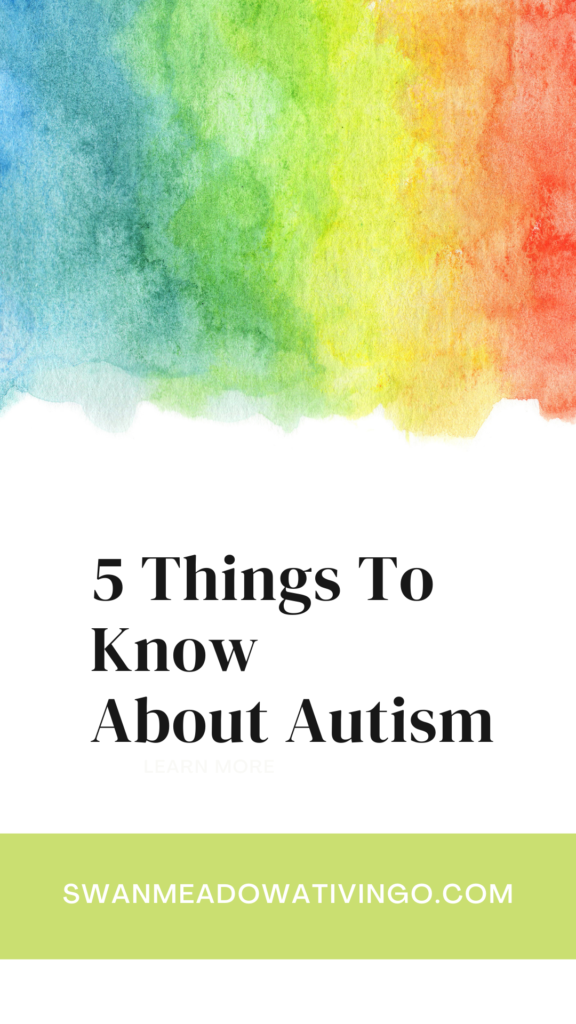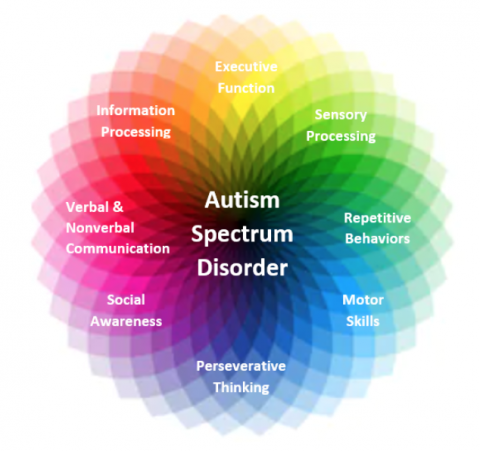
Because both of our children have autism, I figured it was time to do a quick info session regarding it for the blog!
Autism Spectrum Disorder now affects one in 160 people as of 2021 and the question can become whether or not this is a higher developing disability, or if it is that we have created much more awareness around the disorder that it’s becoming easier to diagnose.
The spectrum of autism is not linear.
Both my daughter, age six, and my son, age three, are autistic but are vastly different in nature. The term “Autism Spectrum Disorder” refers to a spectrum of conditions that reflect a neurodevelopmental disability. In the past, many people considered ASD as a linear spectrum but it’s really more like the image below:

So, ultimately what the “spectrum” means is that someone who is autistic might have strong information processing skills but may not have as strong social awareness, or may have repetitive behaviors. There is a quote by Dr. Stephen Shore where he says “when you’ve met one person with autism, you’ve met one person with autism” which ultimately means that there are truly no two autistics that are exactly the same within their spectrum.
By assuming that the spectrum is linear, we are noting that someone who is autistic must either be “low functioning” or perhaps “high functioning,” which is not a really perceptive way of describing an autistic person at all. Although Violet to most may seem “high functioning” from an outsider’s perspective, she still needs speech therapy so we can have her understand her social awareness better. Just because Violet seems “high functioning” does not mean she doesn’t deserve the same available therapies for autism as someone who may seem “low functioning” does. This also does Violet a disservice as she will likely be assumed that she will understand a social or nonverbal command, when it is possible that she may not.
A meltdown and a tantrum are not the same thing.
“If you think someone has gone straight from 0 to 60, you’ve missed how long they’ve been at 59.” Meltdowns occur when someone with autism has been in an environment that has either heightened their senses to the point of no return, or a series of events has occurred that they no longer feel they have control over their own body, or a change in routine has occurred that they feel they did not anticipate or have time to fully understand.
“A meltdown is a response to an overwhelming situation.”
Just because someone is non-verbal does not mean they cannot communicate.
Oliver is three and does not use mouth words, but he still communicates with us.
Females are harder to diagnose with autism than males.
Tests that help diagnose autism are not well equipped to help diagnose autism in females. It has been said that autism is four times more likely to be found in males than females, but (and this is a personal feeling, not scientific by any means, I have nothing to back this up currently) females are more adaptive to their environments and find ways to navigate their disorder better than males because they are better at camouflaging, or “masking.”
For instance, Violet understands that she needs to make eye contact with you during a conversation, even if she might not necessarily want to do so.
And last but not least: Having a child that is autistic is not life-ruining.
I think as parents we all wish for our children to be as healthy as possible so they can go through life without any difficulties or hardships. But when we discover that our child (or ourselves, or a loved one) is autistic this does not mean this is world-ending. Autism is considered a developmental disability, but it is not a death-sentence, and you will not find us here at Swan Meadow complaining or getting on our autism-mom soapboxes to relate to how “hard” it is to parent an autistic child. There is no cure for autism, and that is not what we are looking for here. Will we complain about how hard it is to parent a child in general? Oh, absolutely — that just comes with the territory. If you thought this was an autism super power mom blog, sorry!
